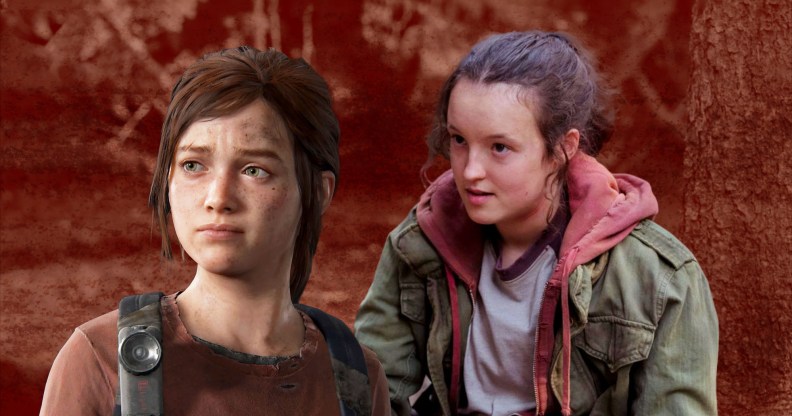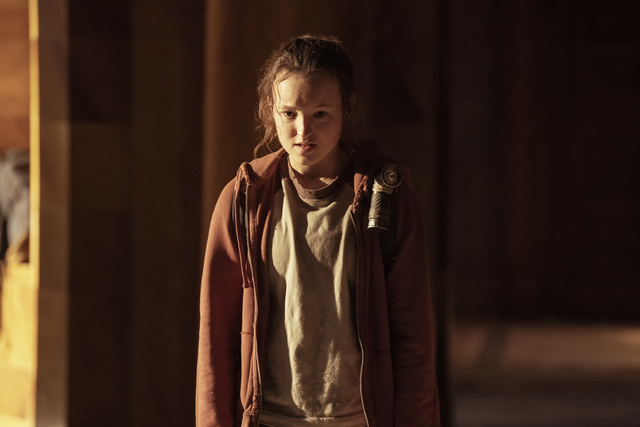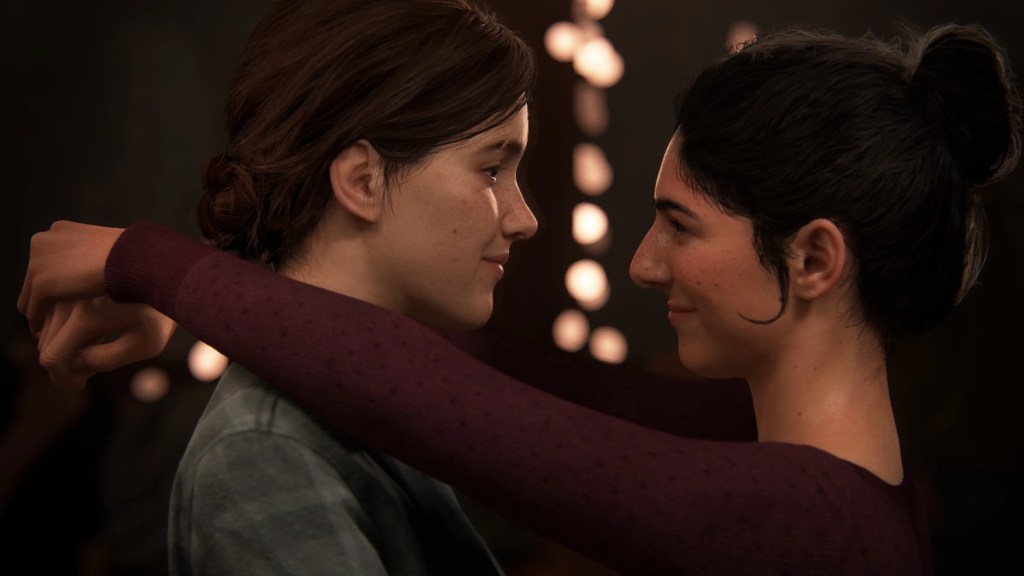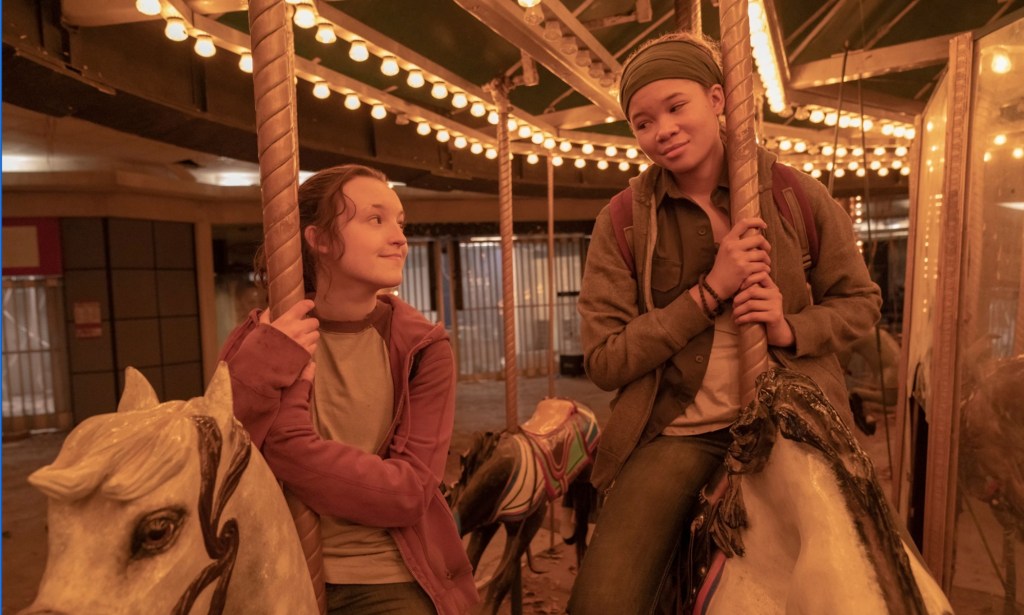A love letter to The Last of Us’ Ellie Williams, one of the greatest TV heroes of all time

Ellie Williams is one of the best female characters ever created. Here’s why. (HBO/Warner Media/Naughty Dog)
The Last of Us has everything: horror, gore, romance and humour. But it would be nothing without Ellie.
Before HBO adapted The Last of Us into a critically acclaimed television show that has taken the world by storm faster than its fungal disease cordyceps, game developer Naughty Dog released the story as a fully playable action adventure/survival-horror game on the PlayStation in 2013.
The game swept its award season, as did its 2020 sequel, The Last of Us: Part Two, with each garnering multiple game of the year awards and mentions for the cast performances, sound design and storytelling.
Both games and the subsequent TV adaptation sprinkle visceral heartbreak and guttural horror amidst fleeting moments of hope, depicting a world in which the ones left behind – if they’re not ravaged by a fungal infection – spend their lives fighting for survival.
And in the eye of the storm, with the wind whipping her hair as she meets you with a scowl (and an expletive and open flick-knife), is one of the best TV characters of all time: Ellie Williams.

Even if you’re not a gamer, it’ll hardly come as a surprise to learn that the landscape of female video game characters is ridden with damaging, sexist stereotypes – just take Lara Croft’s infamous tomb raiding outfit comprising of a crop top and booty shorts. Originally portrayed in the game by Ashley Johnson, Ellie, on the other hand, does not know what the male gaze is. Or if she does, she’s probably threatened to stab it.
Ellie is only 14 in The Last of Us, not that anything as arbitrary as age has ever stopped particularly dark corners of the internet doing what they do. But Ellie gives them nothing and completely resists everything expected of her – as a female, as a teen, as a character in the horror genre.
She subverts everything you’ve probably come to expect from what is essentially a zombie game. Worlds away from most other protagonists in the horror genre, she’s ferocious and violent but – and I hate to labour the point – a 14-year-old-girl when we first meet her. She bonds easily with children and has not lost her playfulness.
There’s no SWAT vest, cigar smoking or testosterone-fuelled jokes. Instead, there’s a purple hoodie, a scavenged pistol and a seriously foul mouth that makes you laugh, then say: “That child should not know those words.”
It makes you want to protect her before realising that she’d be protecting you – if she liked you.
In any form of narrative media, Ellie’s character development is a rare achievement; and one of the reasons that she’s so phenomenal is that as either viewer or player, you have to earn her trust to watch her go from scrappy loner to weapon of mass destruction, one who’s loyal to a fault and will do anything for those she loves.

From a sentimental point of view, it’s sad to see Ellie lose her innocence as the games progress. From a narrative perspective, it’s like seeing an old friend in a different light and thinking: “Everything about how you are now makes perfect sense.” A rare feat in storytelling.
In another blow to the traditional male-dominated battleground of video games that stands on the shoulders of the likes of Call Of Duty, Ellie is canonically queer. And not as in: “This character stares at their straight friend” or “this character is a lesbian for the straight male gamer”; but more like “she kisses her long-time crush, who kisses her back, and it’s beautiful and innocent”. And yes, they both get bitten by a horrific fungus-zombie, but who said being gay was easy?
To Naughty Dog, Craig Mazin and Neil Druckmann’s credit, they could have committed the cardinal sin of queer-baiting and said: “And for our next trick, we’re going to give her a boyfriend,” but instead do the opposite.
The game sequel opens with Joel nearly punching someone in the face for branding Ellie with a homophobic slur. Dina and Ellie’s relationship is front and centre of the plot of the main game. Ellie makes stupid jokes about her (male) friend Jesse not being her type.
It sounds simple, but the context is remarkable. This is a zombie game. On the surface, it’s about death and destruction and sacrifice and violence and pain. And yet, by the end of The Last of Us: Part Two, there is Ellie with a girlfriend and a baby.
Queer children exist and they turn into queer adults. Even in the apocalypse. God dammit, Ellie Williams, you’ve done it again.

There was a lot riding on the TV adaptation of The Last of Us, and many assumed it would be a disaster, not least because of how protective a fandom can be.
The series, however, did the polar opposite, and, for her part, actor Bella Ramsey has been nothing short of phenomenal – as a vehicle for Ellie to come to life and as a voice for the queer community who shuts down bigotry at every turn.
It’s almost impossible to think of the character without her, which is testament to the way Ramsey expertly teases out every nuance that makes Ellie one of the greatest characters ever. She’s disobedient if she doesn’t deem orders worthy of her compliance, and has a capacity for gruesome violence. Seeing her come to life has further transcended any boundaries set by the limitation of a character description that starts with: a 14 year-old-girl.
The portrayal of Ellie in The Last of Us TV series will mean so much to so many queer kids and young girls. Ellie now holds the same cultural relevance as Daenerys Targaryen, as Buffy Summers, as Eleven.
But she plays the game by her own rules, whether that game is the apocalypse or the cultural zeitgeist.
There is only one Ellie.
How did this story make you feel?

